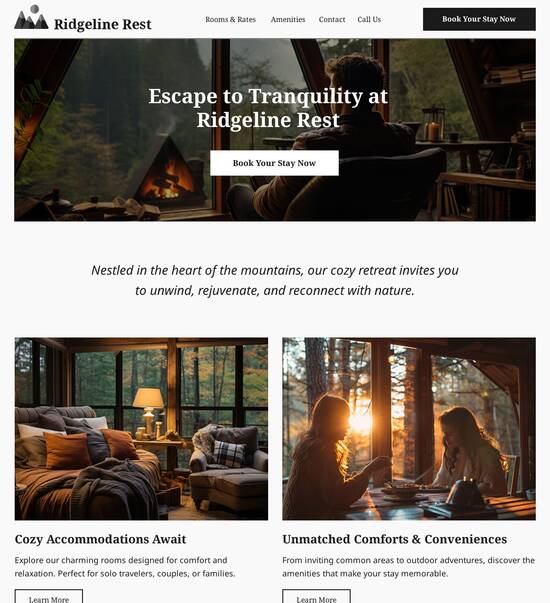
Website Template for Product Photographers
Explore Similar TemplatesAbout template
Create stunning landing pages for product photography with Instapage's customizable templates. Increase brand trust, customer loyalty, and conversions with our easy-to-use platform and built-in optimization and personalization features.
Recommended templates

Easy to build without coding
With the intuitive drag-and-drop builder, anyone on your team can create high-converting pages without any knowledge of code or design. Make enhancements to your landing page with custom widgets using Javascript, HTML/CSS, or third-party scripts.

Multiple layouts for any industry and goal
Select from 500+ landing page layouts built to boost conversions across industry-specific scenarios. Customize them by adjusting fonts, adding images, and generating on-brand content with the AI assistant. Quickly scale with Instablocks® and Global Blocks that you can save, reuse, and update globally.

Loads fast and looks polished on any device
Every template is responsive, which means they present professionally on any device and load blazingly fast with our Thor Render Engine. You can also power them up with Google AMP technology to deliver an unparalleled mobile experience and drive higher conversions.

Robust analytics & experimentation
Get real-time updates and reporting across all your devices, showing the number of visitors, conversions, cost-per-visitor, and cost-per-lead. Launch AI-powered experiments, run A/B tests, and use heatmaps to analyze user behavior, then optimize your landing page to maximize conversions.







Easy to build without coding
With the intuitive drag-and-drop builder, anyone on your team can create high-converting pages without any knowledge of code or design. Make enhancements to your landing page with custom widgets using Javascript, HTML/CSS, or third-party scripts.
Multiple layouts for any industry and goal
Select from 500+ landing page layouts built to boost conversions across industry-specific scenarios. Customize them by adjusting fonts, adding images, and generating on-brand content with the AI assistant. Quickly scale with Instablocks® and Global Blocks that you can save, reuse, and update globally.
Loads fast and looks polished on any device
Every template is responsive, which means they present professionally on any device and load blazingly fast with our Thor Render Engine.
Robust analytics & experimentation
Get real-time updates and reporting across all your devices, showing the number of visitors, conversions, cost-per-visitor, and cost-per-lead. Launch AI-powered experiments, run A/B tests, and use heatmaps to analyze user behavior, then optimize your landing page to maximize conversions.
All the features you need to build lead-generating landing pages
Explore more featuresLearn how to build top-performing landing pages for any goal
FAQs
Leading the way in building high-performing landing pages





A comprehensive guide to using Instapage for landing page optimization
Instapage stands out as the most powerful landing page and conversion rate optimization (CRO) platform available today. This guide walks marketers through the essential steps to accelerate, optimize, and scale their marketing campaigns effectively. Whether you're part of a small team or a large organization, Instapage offers the tools needed to maximize your return on investment.
Why choose Instapage for landing page design?
Selecting the right platform for landing page design is crucial for ensuring campaign success. Instapage is designed with user-friendliness at its core, enabling marketers to build high-converting pages without technical skills. This section outlines the key benefits of using Instapage, specifically how its features align perfectly with the needs of professionals in business services, marketing and advertising, tech, education, and more.
- 100+ high-converting templates: Access a vast library of pre-built templates tailored for various industries, reducing setup time and enhancing lead capture efficiency.
- Built-in optimization tools: Utilize A/B testing, heatmaps, and detailed analytics to continuously improve page effectiveness based on user engagement data.
- Seamless collaboration features: Enhance teamwork with real-time editing, feedback mechanisms, and secure sharing options, enabling swift page creation workflows.
Step 1: Create compelling landing pages
To begin your journey with Instapage, the first step is to create visually appealing and functional landing pages. The platform's intuitive drag-and-drop builder allows users to design without needing advanced technical abilities. Here’s how you can get started:
- Select from templates: Choose a template that suits your campaign goals, whether it's for lead generation or product promotion.
- Customize easily: Use the builder to drag elements into place and personalize text, images, and calls to action to resonate with your target audience.
- Preview and test: Always preview your landing page on different devices to ensure optimal performance before publishing.
Step 2: Optimize your landing pages for conversions
Once your landing pages are live, the next critical phase is optimization. Instapage equips users with essential tools designed to enhance conversion rates effectively. To optimize for success, consider the following:
- Implement A/B testing: Regularly test variations of your landing pages to determine which elements perform best, driving out higher conversion rates.
- Utilize heatmaps: Monitor user interactions on your pages to understand where visitors are engaging most, allowing for informed adjustments.
- Analyze performance metrics: Use the analytics dashboard to track key performance indicators and refine your marketing strategies accordingly.
Step 3: Personalize experiences for your audiences
With the insights gained from optimization, personalization is the final step to ensure your campaigns resonate deeply with specific audience segments. Instapage’s personalization features allow marketers to tailor content dynamically based on user behavior.
- Dynamic text replacement: Customize headlines and messages based on user demographics to ensure relevance.
- AdMaps: Align specific ads with unique landing pages seamlessly to create targeted experiences that lead to a higher engagement.
- Audience tracking: Leverage data tools to monitor individual audience interactions and tailor follow-up campaigns based on their behaviors.
Utilizing Instapage effectively can lead to significant improvements in landing page performance and marketing ROI. By following these steps, marketers can streamline their processes while enhancing their strategic outcomes.
Ready to elevate your marketing campaigns? Explore Instapage today and unlock the full potential of your landing page strategies.
People also ask about Website template for Product photographers
Crafting the perfect online showcase: A deep dive into website templates for product photographers
The essence of a product photographer's website template
A product photographer's website serves as the digital portfolio that showcases their work and individuality. Understanding the unique needs of product photography is essential for creating an engaging website template. Visual storytelling plays a crucial role in presenting products in an appealing manner. Photographers need to convey the story behind the products, allowing potential clients to envision these items in their own settings. This involves not only taking high-quality images but also presenting them in a way that captures the essence of the products. For these reasons, knowing the target audience and their expectations is key.
When creating a website template for product photographers, several key features should be defined. Essential functionalities include high-resolution image galleries, easy navigation, and an aesthetic design that reflects the photographer's brand. User-friendly designs enhance client engagement, ensuring that visitors can easily explore the portfolio without overwhelming distractions. The layout should prioritize the showcased work, allowing images to take center stage and draw viewers into the narrative.
Innovative features tailored for product photographers
Gallery image optimization is crucial for product photographers. The use of high-resolution images is paramount as they highlight the details and nuances of the products. Techniques for effective cropping can also significantly enhance product appeal. By focusing on the details that matter—whether it's texture, color, or craftsmanship—photographers can create striking visuals that resonate with viewers.
Incorporating dynamic slideshow gallery templates is another way to engage viewers. Captivating slideshows that tell a story can effectively retain attention and create an emotional connection with the product. Best practices for implementing slideshow features include ensuring smooth transitions and strategic choices in sequencing images. A compelling narrative can guide viewers through the slides, allowing them to appreciate each product's uniqueness.
Visual presentation: Images that speak volumes
Incorporating thumbnails for quick navigation simplifies the viewer experience and enhances usability. Thumbnails serve as visual gateways to larger images and allow potential clients to browse through portfolios effortlessly. Strategies for selecting the best preview images include choosing those that best represent the product and are visually striking. A cohesive selection of thumbnails can set the tone for the entire portfolio and encourage deeper exploration.
Furthermore, understanding when to use landscape versus portrait orientation is crucial in product photography. Landscape images typically lend themselves well to showcasing multiple products or contextual environments, while portrait images can emphasize individual product qualities. By analyzing case studies of effective image orientation, photographers can glean insights into how to best present their work.
Streamlining your portfolio website design
Structuring a portfolio for maximum impact is vital for photographers. Recommended layouts include clean, grid-based designs that allow for easy viewing of multiple images at once. Categorizing work based on specific markets—such as fashion, food, or technology—can attract the right audiences and present a tailored experience. A well-structured website encourages viewers to find exactly what they are interested in, increasing the likelihood of inquiries and conversions.
Moreover, optimizing plans for mobile responsiveness is essential in today's tech landscape. With an increasing number of users accessing websites via their mobile devices, a mobile-friendly design can make or break a photographer's online presence. Utilizing tools for testing responsiveness across different devices ensures that images display correctly and that navigation remains intuitive on all screen sizes.
Enhancing brand identity through website templates
Customizable elements in website templates allow photographers to reflect their unique brand identities effectively. Understanding color theory and font selections plays a significant role in the design process. Colors evoke emotions, and the right combination can enhance the viewer's experience. Consistent branding throughout the website builds trust and encourages clients to engage more deeply with the showcased work.
Building trust through professional design is another critical aspect. Clean aesthetics without clutter can enhance client conversion rates significantly. Successful brands often utilize efficient design principles, opting for layouts that prioritize user experience and product visibility. By analyzing these brands, photographers can learn how to create an effective online presentation that converts visitors into clients.
Leveraging cloud image storage for seamless access
Using cloud storage has numerous benefits for photographers. It ensures that backups of work exist and can be easily accessible from various devices. Popular cloud storage options for photographers include Google Drive, Dropbox, and Adobe Creative Cloud. Each of these services offers different features that can suit the needs of product photographers, whether it's ample storage space or integrated photo editing capabilities.
Integrating cloud solutions with a website can significantly improve workflow. Linking cloud storage with web templates allows photographers to streamline the process of uploading and managing images. Real-world examples of efficient workflows showcase how easy access to images can facilitate faster updates to portfolios and ensure that the content remains fresh and engaging for potential clients.
Tailored website templates: Plans for every photographer
Photographers face various template options, ranging from free to premium designs. Free website templates often come with basic functionalities and limited customization, while premium options tend to offer a higher level of flexibility and advanced features. Specialized templates tailored for distinct styles of product photography can significantly enhance how products are presented, thus attracting a targeted audience.
Conducting a cost-benefit analysis of professional plans helps photographers understand the value of investing in premium templates. Features such as enhanced SEO capabilities, advanced galleries, and responsive design justify the additional costs, making the investment worthwhile for those serious about their online presence.
User experience features to elevate engagement
Creating intuitive navigation is pivotal for enhancing user interaction on a photography website. Clear, descriptive labels and easily accessible menus guide visitors smoothly through the site. Prioritizing user-friendly systems means ensuring potential clients can quickly find what they are looking for, whether it's a specific portfolio or contact information.
Feedback mechanisms also play a vital role in client interaction. Integrating sections for testimonials and client feedback fosters trust and showcases successful collaborations. Additionally, incorporating social sharing widgets enables greater visibility, allowing satisfied clients to share their experiences easily, thus expanding the photographer's reach and engagement.
Fostering community through member features
Developing a membership or client area can offer exclusive content or previews, enhancing client relationships. Benefits include providing loyal customers early access to new projects or special offers. By creating a sense of belonging, photographers can foster a loyal customer base that actively engages with the brand.
Engaging the audience through initiatives such as newsletters or webinars can further enrich the community atmosphere. Utilizing member feedback helps photographers adapt their offerings and ensure that they are meeting the evolving needs of their clientele, promoting continuous improvement and strengthening community ties.
Final thoughts on maximizing a photography website's potential
Evaluating the success of template choices post-launch is essential. Analyzing web traffic and engagement metrics can reveal what works and what doesn’t, allowing photographers to adjust their strategies accordingly. Understanding user behavior through analytics helps photographers stay attuned to trends and preferences.
Finally, the landscape of product photography websites is continually evolving. Staying updated on the latest trends in website templates and features is crucial. Encouraging ongoing learning and adaptation can set photographers apart in a competitive arena, allowing them to better connect with their audience and enhance their ability to convert visitors into clients.
Ready to skyrocket conversions?
Supercharge your ad campaigns with high-performing landing pages
Get started














